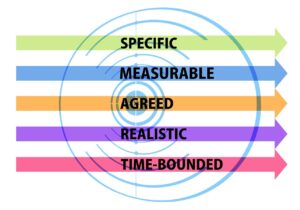
What Happened to the Goals You Set?
Have those goals you set become a distant memory? Most people have set some kind of goals or made some resolutions in January, but by the end of February they’ve probably already given up on some of them. Are you one of those people?
Did you already decide that your resolutions were out of reach? If so, why? What happened?
It’s ok – don’t bother justifying it. You have your ‘reasons’, but in reality, were they just excuses, or was it that you lacked some vital part of the equation?
I’d bet that in a lot of cases, the missing ingredient was commitment, and that’s largely absent when your reason ‘why’ wasn’t clearly defined enough, or strong enough, to help keep you going when things got tough.
Let’s delve a little deeper into this recipe though. You might say that you were committed, or at least thought you were, but something else was missing. Often, that other ingredient may be having ‘the right system’ that would enable you to be disciplined enough to ignore the distractions, overcome any obstacles and push through to achieve the goals anyway.
Setting a goal begins when you identify a problem, a discomfort or a plain old system failure. You realise that you want to change things, so you make a decision to take action and go for a better outcome. So, you set the goal and resolve to change things. Then things go astray. Here are some common reasons.

Lack of Motivation or Commitment
This is often because you didn’t get clear in the first place about why this goal really mattered to you and how you would really feel if and when you achieved it. If it was just a ‘wish’, rather than a real goal. That means that it was unrealistic to expect you would keep going when the obstacles appeared. Clarity is vital.
Unwillingness to Pay the Price
Sometimes you have to ask yourself, “Am I really willing to do what it takes?” You might set a goal to chisel a flat stomach this year, but if you’re not willing to give up certain foods or to do regular exercise, then you might well have to compromise and lower the expectation in line with the price you are willing to pay.

Lack of Self-Belief
You may know that this goal is achievable, but just not by you. There’s an old saying – “If you think you can, you will, but if you think you can’t, you won’t”. We are often our own worst critics. That little voice inside your head that may have been planted there by parents, teachers, school mates or friends, tells you that you’re not good enough and asks, ‘Who do you think you are to be able to achieve that?’ This is why goals need to be big enough to stretch you and make you grow as a person, but small enough to be realistically achievable with the right approach.
Unrealistic Time Frame
Most of us overestimate what we can achieve in the short term, but underestimate what we can do in the long term. We want to pick up the guitar and play it like Eric Clapton by next month, give up eating chips and have a body like a Greek God by next month, or go for a few jogs and be ready for that half-marathon in six weeks. The key here is to reverse-engineer and chunk it down into manageable progress targets. Setting aside and committing to a chunk of time that you can realistically allocate to play guitar each day, or to go for that run, or to track your eating habits and aim to lose a kilogram when you ‘weigh in’ each week – these are realistic steps toward the end goal. When our time frame is out of whack, it’s all too easy to become disheartened and give up.
Poor Systems
This is about failing to stack the odds in your favour. If your goal is to go running every morning, you could leave your running clothes by your bed, so that your goal is the first thing you see when you wake up and it becomes an easy, new habit to maintain. If you want to lose weight, you simply don’t buy the wrong foods and have them in your house, so that you are not tempted to eat them.
Another alternative approach to that though, is similar to an alcoholic having that one bottle of booze in the house that they never open, and this was an idea from Tony Robbins, the world-famous coach, who suggested that you keep some chocolates or treats in a container, but have a label on the lid that asks you, “Is this moment of pleasure worth the lifetime of regret?” The point here is that every time you are tempted, but don’t indulge, you add a little more personal power to yourself in knowing that you have previously succeeded in overcoming that distraction from your plan. If you do succumb though, don’t beat yourself up, just get back on track quickly before the failure becomes the new habit.
***
How to Instead Set Your Goals Using the SMARTS formula

You may well have seen this before, but if you really want to achieve your goals, this can really help.
S – Specific – Be clear about what you really, really want and why that matters to you and/or the people who will benefit from it. For example, you might be working overtime to pay for your children’s school uniforms. That specific outcome will make the effort meaningful. The goals you set and achieved in the past were when you were focused on why it mattered, and the reward outweighed the pain of the effort involved.
M – Measurable – Set a clearly defined target with a tracking system to chart your progress. The motto here is that we’re after progress, not perfection, and as you steadily work towards your goal, you’ll be motivated by knowing you’re on track.
A – Achievable – Don’t aim for the marathon, when you can’t run to the end of the block. If it’s too far out of sight, your inner voice will quickly tell you that you’re doomed to fail. You build belief with incremental gains. Success breeds success, so as you move in the right direction, you become more motivated, and can more easily envision yourself achieving the next, bigger goal.
R – Realistic – Similar to achievable, remember that it’s ok to disregard the non-believers, who tell you it can’t be done, because history is full of people who did achieve what others thought was unrealistic. Author, Joe Dispenza had an accident and was told he would never walk again. He believed he would, and he did the work to make it happen. Turia Pitt was burned so badly, she almost died when caught in a bush fire during an ultra-marathon. She was told about the many things she could no longer expect to achieve, but she kept her belief, did the work, despite incredible pain, and went on to raise two children and become a motivational speaker and author. That said, you may need to work within certain constraints and remind yourself that ‘Rome wasn’t built in a day’. If you ever were planning to eat an elephant, you’d have to eat it a mouthful at a time!
S – Systems – I believe this is crucial, for as James Clear explained in his book, ‘Atomic Habits’, people often fail in their pursuit of goals because they didn’t have the right systems to make the habit change viable. Create what he calls gateway habits, like keeping the running shoes by the bed, or build incremental habits by doing something for a small chunk of time, like committing to playing your guitar for two minutes every day. Often, the hardest part is getting started. Anyone can find two minutes in a 24-hour day, but once you start, the two minutes can become twenty, and so on. It’s often not a ‘time issue’, but rather, a ‘systems issue’.
Be Grateful and Have Fun
 Finally, I’d add that we all know how good we feel when we achieve our goals. Gratitude can play a big part in this. You can be grateful for the body you have now but strive to keep it in better shape and good health. You can be grateful for the relationships you have, but strive to be a better person, friend, partner or parent than you are now. You can be grateful for the home, wealth and possessions that you have now, but it’s also Ok to strive for a bigger home for the kids to each have their own rooms or a bigger play area etc.
Finally, I’d add that we all know how good we feel when we achieve our goals. Gratitude can play a big part in this. You can be grateful for the body you have now but strive to keep it in better shape and good health. You can be grateful for the relationships you have, but strive to be a better person, friend, partner or parent than you are now. You can be grateful for the home, wealth and possessions that you have now, but it’s also Ok to strive for a bigger home for the kids to each have their own rooms or a bigger play area etc.
The goals you set, especially ones that enhance the lives of your family, friends or community can be very rewarding and great fun to achieve. I hope the above may be of some help, and if you think that having a coach would give you that extra edge, and it’s been proven many times that it does, feel free to get in touch with me via this website. Good luck!

Reader Interactions